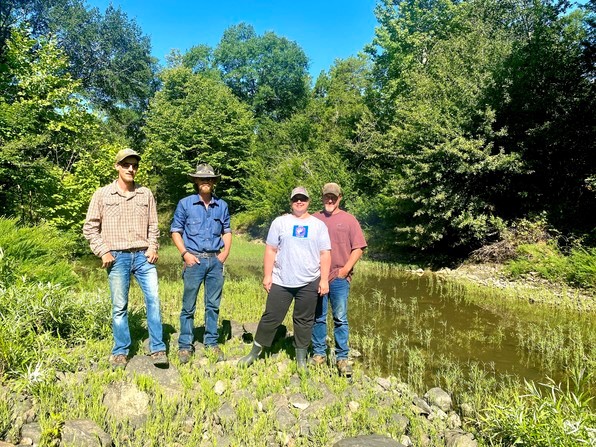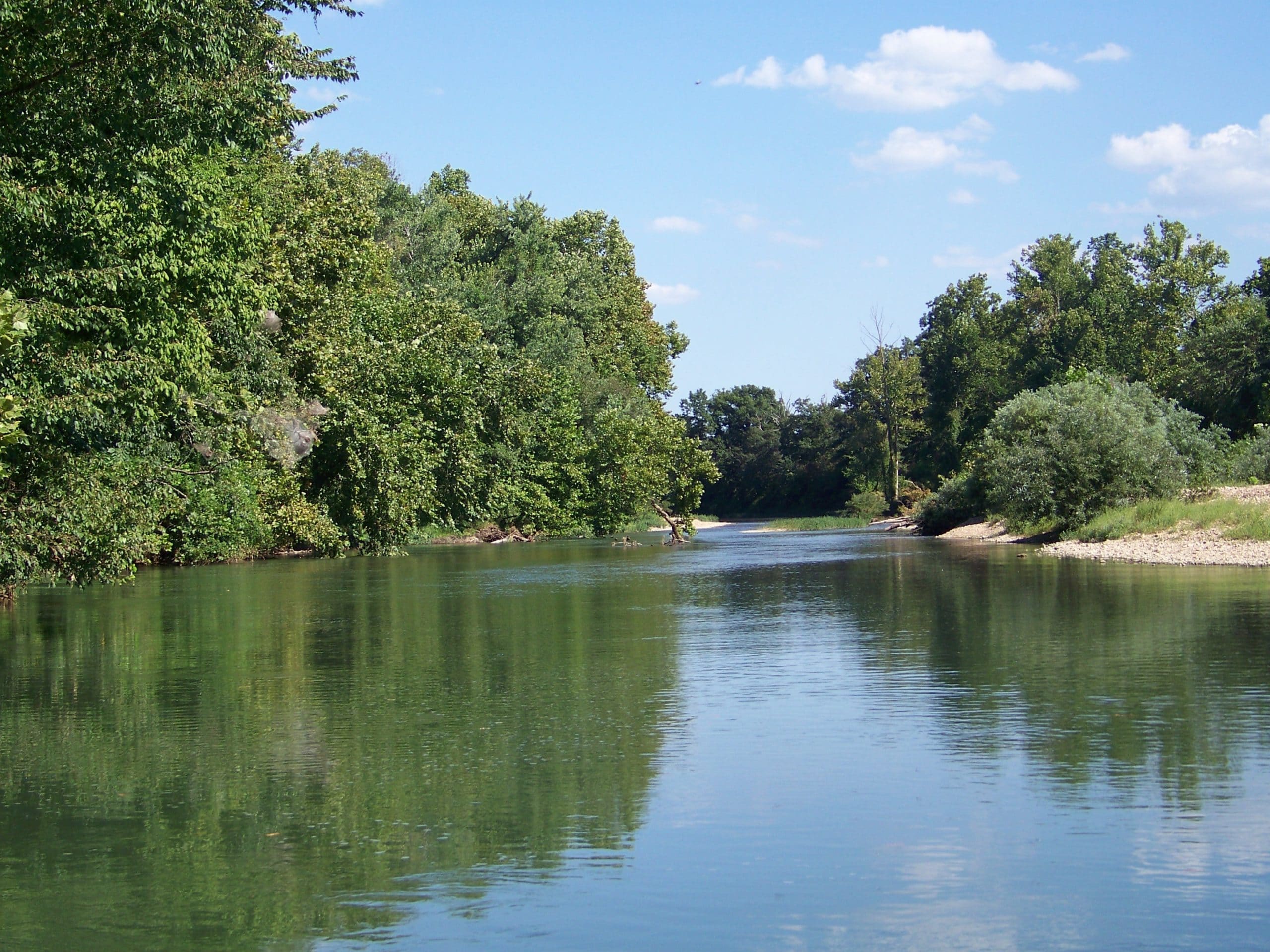Blue Thumb Calendar March Featured Producer: Katie Williams, Life amongst God’s Wonderful Creation

LE FLORE, Okla. – A lesson learned is especially meaningful when it is a lesson lived by multiple generations.
Katie Williams is living a lesson learned by her father, Otha Sober.
“My Dad had a degree in Agronomy from LSU, and he worked for LSU, Texas A&M and a private landowner, who had large fruit, berry and vegetable farms,” she said. “He learned through his time in school and land management that a lot of land managers are taught to use chemicals rather than natural methods. He encouraged me to look to natural methods rather than try and change the natural flow of creation around me.”
Williams’ husband John shares that train of thought.
“He is also very conscientious of nature and always does his best to treat it properly and says we should leave it better than we found it,” Katie said.
As she puts it, “We had the great fortune to move our young family here to this beautiful place some 30 years ago. We have raised our children who are successful citizens of Leflore County.” It’s there, a few miles outside Talihina and not far from the Ouachita National Forest, that the Williams have a fruit farm with blueberries, peaches, apples, pears, plums nectarines and pecans.
“We are in the ‘infrastructure’ stage,” she said. “Our trees and plants are young, but will be a full working farm and winery soon”
The Williams hope to offer an organic option to their community and surrounding area in the near future with a storefront and a place to pick your own option for fresh fruits and veggies.
“We have tried our best to be good to the land from a young age,” she said. “We wanted our children – Darion, Roderick, Vania and Logan – to understand how to help conserve the natural habitat as much as possible and when you do leave a footprint, do it in a manner that’s helpful to the surroundings. When you cut a tree for firewood or several to build a home, or whatever, replant trees to keep the tree population strong and help the atmosphere.”
Their conservation practices include selective thinning of trees and land areas to help promote growth of natural herbs, flowers, etc. for pollination and productive wildlife.
“Learning how the land lays and the natural water flow so everything benefits the most without changing the landscape too much,” Williams said. “Now, as time has gone along we have birds, lizards, herbs, insects that had disappeared from our area now repopulating. Our children Rod and Logan spend hours in the woods filming and taking notes on what wildlife/insects have been there and gone and what seems to work best for them to thrive.”
It’s slow but they are seeing the change and are very thankful they have the opportunity to help the habitat heal and prosper.
“I have a pet peeve of finding trash in the creeks or rivers here and we clean up when we can to keep wildlife from eating plastic bags or garbage that is detrimental,” Katie Williams said. “Logan and Darion are both getting their Biology degree to further their knowledge on keeping the farm a healthy producing place. John, Rod and Logan manage where new plantings need to go, what needs thinning, and for what areas need to be kept available for deer and all other kinds of wildlife. All wildlife, natural growth and people need to have clean, fresh water to grow and stay healthy. If you don’t have good water, nothing survives very well.”
Williams said that is why they appreciate the Blue Thumb program. Everyone involved in Blue Thumb is doing their part in varying ways to keep creeks and rivers healthy.
“We hope in the future to start small programs for local schools to come out and learn about conservation of everyone’s waters and lands,” Williams said. “All of us are very thankful every day that we live in this area. It’s a beautiful thing to be able to spend your life amongst God’s wonderful creation and have a part in keeping it that way for future generations.”
Editor’s Note: The Oklahoma Blue Thumb Calendar highlights important information about conservation, has a featured producer(s) in the months of February through October, and provides contact information for both Blue Thumb staff and Conservation Districts. Plus, this year’s project includes an in-depth producer(s) feature story, such as the one following. If you would like a copy of the free 2021 Blue Thumb Calendar, please contact Blue Thumb Program Director Rebecca Bond at Rebecca.bond@conservation.ok.gov.
The Dinwiddies have done several projects that helped to control erosion and bring water retention up on their land. They also use minimum tillage practices and always try to incorporate something green and growing into their tillage seasons while never leaving the soil bare.
“We also apply microbes to our crops, fruit trees, and produce,” he said. “We grow and maintain families of non-GMO produce and fruit. We have also switched to feeding our poultry non-GMO feed for egg production.”
Benefits from their tillage practices dramatically increase the quality of the soil “as well as dramatically decrease the level of commercial input needed to grow those crops,” Josh said. They grow pearl millet, sugar-dense sorghums, and forage corn to bale to feed their livestock over the winter giving them a very nutrient-dense forage.
“The main benefits we receive from feeding non-GMO is maintaining a non-scientifically altered diet for our stock, and all of those who consume our meat and eggs, including ourselves,” he said.
Their commitment to environmental awareness reaches beyond the farm/ranch. Kit sits on the Board of Directors for the Love County Conservation District. This role is important to her because she wants to do her part to leave the next generation healthy land, clean water, and a diverse ecosystem. Josh and Kit are also members of the Registered Texas Longhorn Beef Producer Program. This program is important to them to provide healthy meat into a market for today’s health-conscious consumers. They are members of the Texas Longhorn Breeders Association of America, the International Texas Longhorn Association, and Josh is the President of the Indian Territory Texas Longhorn Association.
“We believe our role in all of these organizations are important to furthering the conservation of America’s first cattle, the Texas Longhorn,” he said.
The couple also make an effort to continue learning.
“The area and state meetings are always inspiring because you’re in a room full of peers that care about conservation,” Kit said. “It is rare to find a concentration of individuals that are on the same page and believe in the gravity of the role we play in ensuring that we have healthy land and water.”
They were asked what it is that they enjoy most about being around those who champion water quality and soil health.
“It gives us hope that there are people out there that understand that conservation is the baseline of where healthcare begins,” Kit said. “We also appreciate people that have compassion for the organisms that we share this earth with.”
Also, they have found that the demand is there for what they supply and “largely because of the quality and how it is grown.”
“This has inspired others to implement some of the same practices,” Josh said. “We believe we are a working model of natural farming practices and showing how it works economically.”
Editor’s Note: The Oklahoma Blue Thumb Calendar highlights important information about conservation, has a featured producer(s) in the months of February through October, and provides contact information for both Blue Thumb staff and Conservation Districts. Plus, this year’s project includes an in-depth producer(s) feature story, such as the one following. If you would like a copy of the free 2021 Blue Thumb Calendar, please contact Blue Thumb Program Director Rebecca Bond at Rebecca.bond@conservation.ok.gov.
